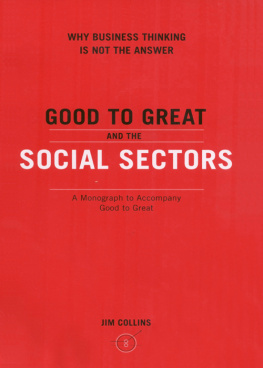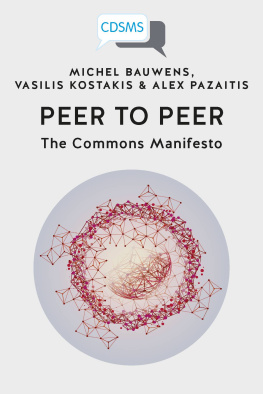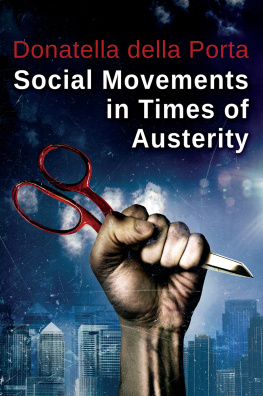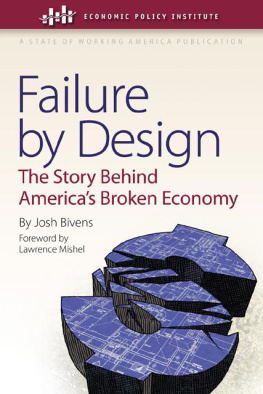The University of Chicago Press, Chicago 60637
The University of Chicago Press, Ltd., London
2017 by The University of Chicago
All rights reserved. No part of this book may be used or reproduced in any manner whatsoever without written permission, except in the case of brief quotations in critical articles and reviews. For more information, contact the University of Chicago Press, 1427 E. 60th St., Chicago, IL 60637.
Published 2017.
Printed in the United States of America
26 25 24 23 22 21 20 19 18 17 1 2 3 4 5
ISBN -13: 978-0-226-44600-4 (cloth)
ISBN -13: 978-0-226-44614-1 (paper)
ISBN -13: 978-0-226-44628-8 (e-book)
DOI : 10.7208/chicago/9780226446288.001.0001
Library of Congress Cataloging-in-Publication Data
Names: Collins, Jane Lou, 1954 author.
Title: The politics of value : three movements to change how we think about the economy / Jane L. Collins.
Description: Chicago ; London : The University of Chicago Press, 2017. | Includes bibliographical references and index.
Identifiers: LCCN 2016029262 | ISBN 9780226446004 (cloth : alk. paper) | ISBN 9780226446141 (pbk. : alk. paper) | ISBN 9780226446288 (e-book)
Subjects: LCSH: EconomicsSociological aspects. | EconomicsPolitical aspects. | Value. | ValueSocial aspects. | Social responsibility of business. | Social movementsUnited StatesHistory21st century. | Common goodEconomic aspects.
Classification: LCC HM 548 . C 644 2017 | DDC 303.3/72dc23 LC record available at http://lccn.loc.gov/2016029262

This paper meets the requirements of ANSI / NISO Z 39.481992 (Permanence of Paper).
Three talented graduate student researchers helped collect the empirical material for this book. Working with them was a joy. H. Jacob (Jake) Carlson, Walker Kahn, and Jacki Hartley are excellent ethnographers, and their skills contributed immeasurably to the project. I enjoyed our sessions formulating questions, discussing interviews and observations, and batting around different theoretical framings. I appreciated their humor and good sense, their willingness to read a great deal of material to bring themselves up to speed on diverse topics, and the way each of them was always up for a new challenge.
I thank the University of Wisconsin for a sabbatical leave and the National Science Foundation for research support, as well as the Rockefeller Center at Bellagio for a residential fellowship. The members of the brilliant and entertaining group of scholars and artists who were in my cohort at Bellagio were one of the first audiences for the project, and I appreciate their enthusiastic feedback. Susana Narotzky and her GRECO (Grassroots Economics) research group at the University of Barcelona (as well as Sharryn Kasmir and Tania Li, who were participants with me in a workshop there) helped me to refine my ideas at an early stage. Members of the GRECO group provided extremely useful reactions to my findings, and I learned so much from hearing them talk about their own studies of vernacular economy.
Thanks to the many colleagues and students who have read or heard and commented on versions of the work in progress: Don Kalb, Don Nonini, Stacey Oliker, Gay Seidman, Gavin Smith, Ida Susser, and too many others to name in department seminars in Gender and Womens Studies and Community and Environmental Sociology at UW-Madison. I also thank participants in the 2011 American Ethnological Society conference in San Juan, Puerto Rico, who provided comments on an early paper on the Madison protests.
Finally, I appreciate the guidance and labors of Susan Bielstein at University of Chicago Press and the feedback from the three engaged and helpful manuscript reviewers.
Class struggle is pervasive in society. It is in the workers demanding higher wages, and in consumers boycotting a brand. It is in environmentalists stopping the construction of a new airport terminal and in women questioning the traditional division of labor.... It is in refugees crossing the borders, in landless peasants reclaiming land, and in indigenous people reclaiming dignity.... All these and many others are instances of non-monetary value practices and correspondent social forces that... posit a limit to capital and its own specific value practices.
MASSIMO DE ANGELIS , The Beginning of History
Introduction
The head of the local association of manufacturers was adamant: If you want to create wealth, youve got to mine it, make it, or grow it. If you arent making something, youre not creating wealth, youre just shuffling money around. When the skeptical interviewer pointed to the significance of services in the states economy, he countered, I guess I do include tourism. You could also throw in health care. If you look at total revenue, health care would actually be number two. I dont think of it that way though. [Health care] is not a wealth creator, its a wealth redistributor.
Given that the service sector accounts for about 80 percent of the US economy and includes not just the extremely important health care industry but also such booming sectors as telecommunications and finance, the business leaders statement was somewhat puzzling. Clearly these activities involve vast flows of resources and form part of gross domestic product (GDP), the official measure of national accounts. They employ millions of people, provide essential services, and stimulate demand in other sectors. To argue that they do not create wealth seems counterintuitive. Of course the businessmans assessment was not universally shared. Presented with this quotation, a public school teacher quipped, And so under that philosophy, plastic dog shit is more valuable than running a snowplow? These individuals held fundamentally different views about what makes the economy work, creates social benefit, and is worthy of acknowledgment and remuneration.
This book maps a set of cultural conversations about the kinds of investments and activities that contribute to the health and vitality of the economyin essence, about what creates economic value. It presents and analyzes three cases where citizens have acted to motivate reflection on what is needed to create a just, sustainable, and well-functioning economic system. In one of these cases activists raise questions about the responsibilities of business, in a second, about the significance of local economy, and in a third, about the contributions of the public sector. This is not a story about the formulations of professional economists, except as these circulate through popular culture; it is concerned with vernacular discourses and practicesthe ways people conceptualize and enact their understandings of the economy and its workings in daily life.
At first glance it seems that value is more or less a closed topic, because in recent years market frameworks have come to dominate most discussions of the economy. There appears to be widespread agreement about what economic value means and how to measure it. GDP growth, profitability, and share price are some of the accepted metrics of economic health, and unrestrained markets and fiscal responsibility are the ways to get there. The










 This paper meets the requirements of ANSI / NISO Z 39.481992 (Permanence of Paper).
This paper meets the requirements of ANSI / NISO Z 39.481992 (Permanence of Paper).